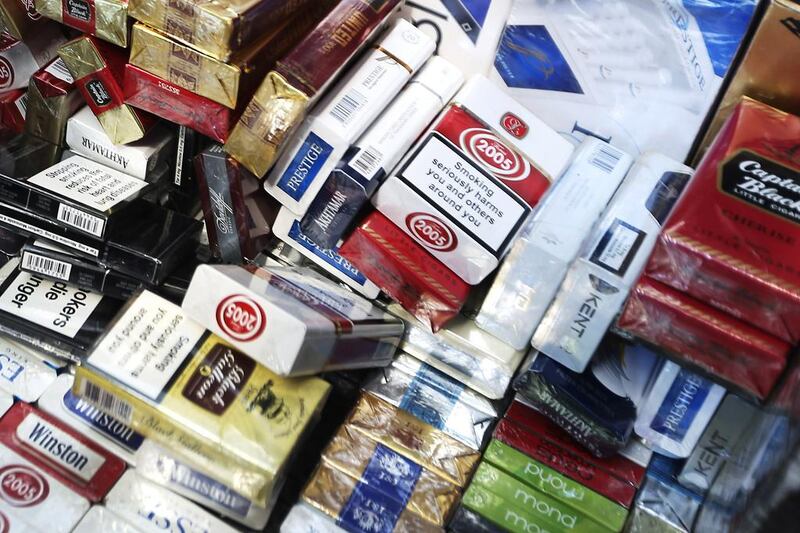Excise tax was introduced across the country on October 1 in a bid to diversify the Government’s revenue streams and discourage the consumption of products that harmed the environment and public health. One week after the ‘sin tax’ took effect, The National visited tobacconists and supermarkets to assess the effects the federal tax has had on consumers and trade.
Store managers have been enjoying a cash boom as shoppers cleared shelves of cigarettes and energy drinks before the Government’s new “sin tax” came into force.
Many shops across Dubai were low on stock of the usual selection of energy drinks, cigarettes and soft drinks as consumers took advantage of cheaper prices.
While cigarettes and caffeinated sports drinks doubled in price, other carbonated sugar drinks were hit with a 50 per cent tax, to help encourage healthier choices at the checkout.
Supermarkets may have seen a spike in sales in the days before October 1 but some stores have struggled to re-stock shelves as supplies ran low.
Takings have been up by almost 50 per cent but retailers must now prepare to pay the first tax bill under the new scheme.
“Sales were very high before the tax came in, particularly in cigarettes,” said Ernesto Ibatan, assistant store manager at Carrefour in Barsha Heights.
“Since then, there has been a noticeable drop in sales this week on both carbonated drinks and cigarettes.
“It is too early to tell if this will be happening more in future.”
Gokarna Rae, from Nepal, a fresh food supervisor at the Carrefour market in Remraam, has experienced similar shortages of the most popular drinks.
“We were out of stock of most soft drinks until Wednesday, as people were buying all of our supplies before the prices went up,” he said.
“We have two deliveries a week, and have no warehouse to keep stock, so we have to make new orders every couple of days.
“This week has been a lot quieter, so the tax is having an impact it would seem.”
Businesses must pay the tax they owe on the items subject to the new excise within 15 days of the end of the month in which the goods were imported into the UAE.
___________________
Excise tax: one week on
[ Northern Emirates retailers yet to determine cigarette tax impact due to supply shortage ]
[ Youngsters in Sharjah defiant on fizzy drink consumption despite price hike ]
[ UAE tobacconists unsure if dokha falls under new excise tax regulations ]
___________________
A Federal Tax Authority website provides sellers with a transaction ID so they can complete the payment process.
In future, customs officials will not clear any shipments of goods subject to excise tax without presentation of a transaction ID, so authorities can keep track of how much tax is owed.
Although electronic tax registration is free, paper registration costs Dh500, and renewal fees of Dh3,000 for tax agents must be paid every three years.
Fines for late payments and other tax-related violations range from Dh1,000 to Dh50,000.
Vikesh, a store manager at Choithrams in Dubai, said higher prices had led to a surge in turnover, despite less customers buying the newly taxed items.
“Only about 30 per cent of our customers have changed the way they shop for cigarettes and carbonated drinks,” he said.
“There is still 70 per cent of customers who continue to buy, so with the price increases we are seeing higher turnover in sales, from about Dh8,000 a day to Dh12,000 on these products.
“People are still buying the items; they may be buying less overall – but they are more expensive so our turnover has increased.
“Customers are still buying carbonated drinks as normal. It will take some time to see if there is any major difference that lasts.”
Doctors have welcomed the introduction of tax on unhealthy products as the start of a change in mentality towards poor lifestyle but some have questioned what impact it will have on the majority who can afford to pay higher prices.
___________________
Read more:
[ No tax shake up for carbonated water, UAE authorities say ]
[ Departing airport passengers won't pay tobacco tax, Dubai Duty Free says ]
[ High prices and low stocks hit UAE's ardent smokers ]
___________________
Some schools have already banned consumption of caffeinated drinks on site, with staff admitting it will be hard to change other habits overnight.
Dr Sadaf Jalil Ahmed, a doctor at Deira International School, said young people will continue to smoke and drink energy drinks, regardless of price.
“After five years of me repeating the message on caffeinated drinks, pupils know to be very careful around the school,” she said.
“Some children have admitted to me they smoke, but they are very few.
“Out of 100 children, five or six would be smokers who will always have a packet on them – and a further 10 to 15 children will be social smokers.
“This tax is absolutely the right move, and it may put off some of the social smokers.
“It’s still within the affordability of many people but the ones who will be hit are likely to be labourers.”







